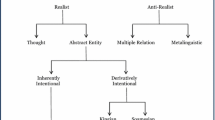Abstract
When each state of the world is a maximally specific, consistent description of the world, including the description of the knowledge and ignorance of all individuals, the standard partitional model of knowledge is inconsistent with the assumption that an individual's powers are limited to that of a Turing machine. We show, however, that the epistemic logicS4 is consistent with computational constraints.
Similar content being viewed by others
References
Abreu, D. and A. Rubinstein: 1988, ‘The Structure of Nash Equilibrium in Repeated Games with Finite Automata’,Econometrica 56, 1259–1281.
Anderlini, L.: 1989, ‘Computability and Communication in Common Interest Games’, mimeo, Cambridge University.
Aumann, R. J.: 1976, ‘Agreeing to Disagree’,Annals of Statistics 4, 1236–1239.
Aumann, R. J.: 1987, ‘Correlated Equilibrium as an Expression of Bayesian Rationality’,Econometrica 55, 1–18.
Benacerraf, P.: 1967, ‘God, the Devil and Gödel’,The Monist 51, 9–32.
Benthem, J. van, and W. Blok,: 1978, ‘Transitivity follows from Dummett's Axiom’,Theoria 44, 117–118.
Binmore, K.: 1987, ‘Modelling Rational Players I and II’,Economics and Philosophy 3, 179–214, and4, 9–55.
Binmore, K. and H. Shin: 1992, ‘Algorithmic Knowledge and Game Theory’, in C. Bicchieri and M. Dalla Chiara (eds.),Knowledge, Belief and Strategic Interaction, Cambridge University Press.
Boolos, G.: 1979,The Unprovability of Consistency, Cambridge University Press.
Boolos, G. and R. Jeffrey: 1980,Computability and Logic, (second edition) Cambridge University Press.
Brandenburger, A.: 1992, ‘Knowledge and Equilibrium Games’,Journal of Economic Perspective 6, 83–102.
Canning, D.: 1992, ‘Rationality, Computability, and Nash Equilibrium’,Econometrica 60, 877–888.
Geanakoplos, J.: 1992, ‘Common Knowledge’,Journal of Economic Perspective 6, 53–82.
Gödel, K.: 1931, ‘Über formal unentscheidbare Sätze der Principia Mathematica und verwandter Systeme I’Monatschefte für Mathematik und Physik 38, 173–198, reprinted in English in Davis (ed.),The Undecidable, Raven, New York, 1965.
Harsanyi, J.: 1967, ‘Games with Incomplete Information Played by Bayesian Players, parts I, II, III’,Management Science 14, 159–82, 320–34, 486–502.
Jeffrey, R.C.: 1983,The Logic of Decision, Second Edition, Chicago University Press.
Lismont L. and P. Mongin: 1994, ‘On the Logic of Common Belief and Common Knowledge’,Theory and Decision 37, 75–106 (this issue).
Morris, S.: 1992, ‘Revising Knowledge: A Decision Theorietic Approach’ CARESS discussion paper #92-27, University of Pennsylvania.
Reinhardt, W.: 1986, ‘Epistemic Theories and the Interpretation of Gödel's Incompleteness Theorems’,Journal of Philosophical Logic 15, 427–474.
Reny, P.: 1992, ‘Rationality in Extensive-Form Games’Journal of Economic Perspective 6, 103–119.
Rosser, J.: 1936, ‘Extensions of Some Theorems of Gödel and Church’,Journal of Symbolic Logic 1, 87–91.
Rubinstein, A.: 1986, ‘Finite Automata Play and Repeated Prisoner's Dilemma’,Journal of Economic Theory,39, 83–96.
Savage, L.: 1954,The Foundations of Statistics, Wiley, New York.
Simon, H.: 1976, ‘From Substantive to Procedure Rationality’, in S. Latsis (ed.),Method and Appraisal in Economics, Cambridge University Press.
Author information
Authors and Affiliations
Rights and permissions
About this article
Cite this article
Shin, H.S., Williamson, T. Representing the knowledge of turing machines. Theor Decis 37, 125–146 (1994). https://doi.org/10.1007/BF01079208
Issue Date:
DOI: https://doi.org/10.1007/BF01079208




